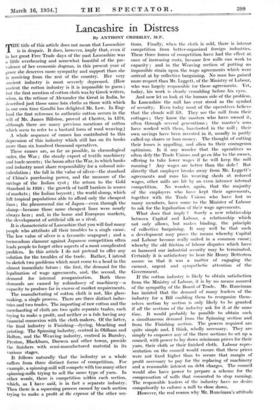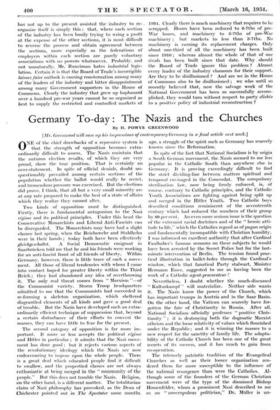Lancashire in Distress By ANTHONY CROSSLEY. M.P.
THE title of this article does not mean that Lancashire is in despair. It does, however, imply that, even if in her great Free Trade days of the past Lancashire was a little overbearing and somewhat boastful of the pre- valence of her economic dogmas, in this present year of grace she deserves more sympathy and support than she is receiving from the rest of the country. Her very ancient industry is most severely depressed. (How ancient the cotton industry is it is impossible to guess ; but the first mention of cotton cloth was by Greek writers, when, in the retinue of Alexander the. Great in India, he described- just those same loin cloths as those with which in our own time Gandhi has delighted Mr. Low. In Eng- land the first reference to authentic cotton occurs in the will of Mr. James Billston, proved at Chester, in 1578, although there are many previous mentions of cotton which seem to refer to a bastard form of wool weaving.) A whole sequence of causes has contributed to this depression of this industry which still has on its books more than six hundred thousand operatives.
These causes are, so far as possible, in chronological order, the War ; the steady export of textile machinery and trade secrets ; the boom after the War, in which banks and industry must share responsibility for a colossal mis- calculation ; the fall in the value of silver—the standard of China's purchasing power, and the measure of the savings of the Indian ryot ; the return to the Gold Standard in 1926 ; the growth of tariff barriers in scores of markets ; the Indian boycott ; the world slump, which left tropical populations able to afford only the cheapest lines ; the phenomenal rise of Japan—even through the slump—because those same cheapest lines were nearly always hers ; and, in the home and European markets, the development of artificial silk as a rival.
It is characteristic of Lancashire that you will find many people who attribute all their troubles to a. single cause. The low value of silver is a favourite scapegoat ; and a tremendous clamour against Japanese competition often leads people to forget other aspects of a most complicated problem. In this article I do not pretend to offer any solution for the troubles of the trade. Rather, I intend to sketch two problems which must come to a head in the almost immediate future : the first, the demand for the legalization of wage agreements, and, the second, the demand for internal reorganization. Both these demands are caused by redundancy of machinery—a capacity to produce far in excess of market requirements. The manufacturing of cotton cloth is not, like glass- making, a single process. There are three distinct indus- tries and two trades. The importing of raw cotton and the inerchanting of eloth are two quite separate trades, each trying to make a profit, and neither as a iule having any financial connexion with the cloth makers. Of the latter, the final industry is Finishing—dyeing, bleaching and printing. The Spinning industry, centred in Oldham and Bolton, and the Weaving industry, centred in Burnley, Preston, Blackburn, Darwen and other towns, provide the finishers with semi-manufactured material in its various stages.
It follows naturally that the industry as a whole suffers from three distinct forms of competition. For example, a spinning-mill will compete with too many other spinning-mills trying to sell the same, type of yarn. In other words, there is competition within each section, which, as I have said, is in fact a separate industry. Then there is a squeezing process caused by each section trying to make a profit at the expense of the other sec- tions. Finally, when the cloth is sold, there is intense competition from better-organized foreign industries.
These three forms of competition have had the effect at.
once of increasing costs, because few mills can work to capacity ; and in the Weaving section of putting an impossible strain upon the wage agreements which were arrived at by collective bargaining. No man has gained more respect than Mr. Leggett, of the Ministry of Labour, who was largely responsible for these agreements. Yet, today, his work is clearly crumbling before his eyes.
And now let us look at the human side of the problem.. In Lancashire the mill has ever stood as the symbol.
of security. Even today most of the operatives believe that the clouds will lift. They see the mill from their cottages ; they know the masters who have owned it, often through several generations ; the master's sons have worked with them, barefooted in the mill ; their own savings have been invested in it, usually in partly called-up shares or loan money. The thought of cutting their losses is appalling, and alien to their courageous optimism. Is it any wonder that the operatives so often defy the Trade Unions and go en bloc to the owner, offering to take lower wages if he will keep the mill running ? Any wages are better than the dole ! But directly that employer breaks away from Mr. Leggett's agreements and runs his weaving sheds at reduced wages, other mills are hit by an even intenser internal competition. No wonder, again, that the majority of the employers who have kept their agreements, together with the Trade Unions who have lost so many members, have come to the Minister of Labour to ask for the legalization of their wage agreements.
What does that imply ? Surely a new relationship between Capital and Labour, a relationship which not only allows, but makes binding, the principle of collective bargaining. It may well be that such a development may prove the means whereby Capital and Labour become really united in a common cause; whereby the old friction of labour disputes which have so harassed our industrial security may be terminated. Certainly it is satisfactory to hear Sir Henry Betterton assure us that it was a matter of engaging the earnest, urgent and sympathetic attention of the Government.
If the cotton industry is likely to obtain satisfaction from the Ministry of Labour, it is by no means assured of the sympathy of the Board of Trade. Mr. Runciman has insisted that the demand of many leaders of the industry for a Bill enabling them to reorganize them- selves section by section is only likely to be granted if all the sections of the industry ask for it at the same time. It would probably be possible to obtain such a simultaneous demand from the Spinning section and from the Finishing section. The powers required are quite simple and, I think, wholly necessary. They arc simply to empower any of the three sections to set up a council, with power to lay down minimum prices for their yarn, their cloth or their finished cloth. Labour repre- sentation on the council would ensure that these prices Were not fixed higher than to secure that margin of profit necessary to pay for the replacing of machinery and a reasonable interest on debt charges. The council Would also have power to prepare a scheme for the compensation of mills that consented to stop running. The responsible leaders of the industry have no desire compulsorily to enforce a mill to close down.
However, the real reason why Mr. Runciman's attitude has not up to the present assisted the industry to re- . organize itself is simply this : that, where each section of the industry has been busily trying to wring a profit at the expense of the other sections, it is most difficult to reverse the process and obtain agreement between the sections, more especially as the federations of employers within each section are purely voluntary associations with no powers whatsoever. Probably, and not unnaturally, Mr. Runeiman hates industrial legis- lation. Certain it is that the Board of Trade's incorrigible laissez .faire outlook is causing consternation among many of the leaders of the industry and bitter disappointment among many Government supporters in the House of Commons. Clearly the industry that grew up haphazard over a hundred pre-war years cannot be so organized as best to supply the restricted and controlled markets of 1984. .Clearly there is much machinery that requires to be scrapped. Hours have been reduced, to 6-7ths of pre- War hours, and machinery to 6-7ths of pre-War machinery ; but markets to less than 3-7ths. No machinery is earning its replacement charges. Only about one-third of all the machinery has been . built since 1910 ; whereas almost the whole of that_ of our rivals has been built since that date. Why , should the Board of Trade ignore this problem ? Almost every leader of the industry clamours for their support. Are they to be disillusioned ? And are we in the House of Commons also to be disillusioned ; we who until so recently believed that, now the salvage work of the National Government has been so successfully accom- plished, they would turn without respect to party cliches to a positive policy of industrial reconstruction?











































 Previous page
Previous page